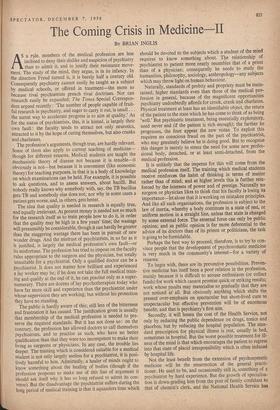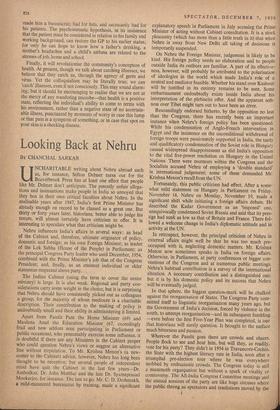The Coming Crisis in Medicine II
BY BRIAN INGLIS a rile, members of the medical profession are less S inclined to deny their dislike and suspicion of psychiatry than to admit it, and to justify their resistance move- ment. The study of the mind, they argue, is in its infancy. In the direction Freud turned it, it is barely half a century old. Consequently psychiatry cannot easily be taught as a subject by medical schools, or offered in treatment—the more so because rival psychiatrists preach rival doctrines. Nor can research easily be expanded; The Times Special Correspon- dent argued recently : 'The number of people capable of fruit- ful research in psychiatry, and eager to carry it out, is small ... the surest way to accelerate progress is to aim at quality.' As for the status of psychiatrists, this, it is hinted, is largely their own fault : the faculty tends to attract not only neurotics, attracted to it by the hope of curing themselves, but also cranks and charlatans.
The profession's arguments, though true, are hardly relevant. Some of them also apply to current teaching of medicine— though for different reasons. Medical students are taught the mechanistic theory of disease not because it is tenable—it obviously is not—but because it is convenient (like economic theory) for teaching purposes, in that it is a body of knowledge on which examinations can be held. For example, it is possible to ask questions, and to assess answers, about bacilli. But nobody really knows why somebody with, say, the TB bacillus gets TB and somebody else does not; nor why in some cases a patient gets worse, and, in others, gets better.
The idea that quality is needed in research is equally true, and equally irrelevant. At present money is needed not so much for the research itself as to train people how to do it, in order that the quality may be high in a few years' time; the wastage will presumably be considerable, though it can hardly be greater than the staggering wastage there has been in pursuit of new wonder drugs. And the mistrust of psychiatrists, in so far as it is justified, is largely the medical profession's own fault—or its misfortune. The profession has tried to impose on the faculty rules appropriate to the surgeon and the physician, but totally unsuitable for a psychiatrist. Only a qualified doctor can be a psychiatrist. It does not matter how brilliant and experienced a lay worker may be; if he does not take the full medical train- ing and qualify at the end of it, he can practise only as a super- numerary. There are dozens of lay psychotherapists today who have far more skill and experience than the psychiatrist under whose supervision they are working; but without his protection they have no standing.
The public is hardly aware of this; still less of the bitterness and frustration it has caused. The justification given is usually that membership of the medical profession is needed to pre- serve the required standards. But it has not done so : on the contrary, the profession has allowed doctors to call themselves psychiatrists, and to practise as such, who have no better qualification than that they were too incompetent to make their living as surgeons or physicians. In any case, the trouble lies deeper. The training which is considered suitable for a medical student is not only largely useless for a psychiatrist, it is posi- tively harmful to him. Admittedly, a healer of minds ought to know something about the healirig of bodies (though if the profession proposes to make use of this line of argument it should ask itself why it has so long refused to admit its con- verse). But the disadvantage the psychiatrist suffers during the long period of medical training is that it squanders time which should be devoted to the subjects which a student of the mind requires to know something about. The relationship of psychiatrist to patient more nearly resembles that of a priest than of a physician; consequently he needs to study the humanities, philosophy, sociology, anthropology—any subjects which may throw light on human behaviour.
Naturally, standards of probity and propriety must be main- tained; higher standards even than those of the medical pro- fession in general, because of the magnificent opportunities psychiatry undoubtedly affords for crook, crank and charlatan. Physical treatment at least has an identifiable object, the return of the patient to the state which he has come to think of as being `well.' But psychiatric treatment, being essentially exploratory, need never end (if the patient is rich enough); the farther he progresses, the finer appear the new vistas. To exploit this requires no conscious fraud on the part of the psychiatrist. who may genuinely believe he is doing good. But to recognise this danger is merely to stress the need for some new profes- sional body, detached, or at least semi-detached, from the medical profession.
It is unlikely that the impetus for this will come from the medical profession itself. The training which medical students receive reinforces the habit of thinking in terms of matter rather than of mind; and at higher levels this is further rein- forced by the interests of power and of prestige. Naturally no surgeon or physician likes to think that his faculty is losing its importance—let alone that it is working on mistaken principles. And like all such organisations, the profession is subject to the law of inertia, whereby a body continues in a state of rest, or uniform motion in a straight line, unless that state is changed by some external force. The external force can only be public opinion; and as public opinion is far more deferential to the advice of its doctors than of its priests or politicians, the task is going to be formidable.
Perhaps the best way to proceed, therefore, is to try to con- vince people that the development of psychosomatic medicine is very much in the community's interest—for a variety of reasons.
To begin with, there are its preventive possibilities. Preven- tive medicine has itself been a poor relation in the profession, mainly because it is difficult to arouse enthusiasm (or collect funds) for work which cannot promise quick or striking results; work whose results may materialise so gradually that they are not noticed at all. But obviously anything which shifts the present over-emphasis on spectacular but short-lived cure to unspectacular but effective prevention will be of enormous benefit; and that is psychiatry's first aim.
Secondly, it will lessen the cost of the Health Service, not only by reducing the public dependence on drugs, tonics and placebos, but by reducing the hospital population. The stan- dard prescription for physical illness is rest, usually in bed, sometimes in hospital. But the worst possible treatment for ill- ness of the mind is that which encourages the patient to regress into that state of placid irresponsibility which is often induced by hospital life.
Not the least benefit from the extension of psychosomatic medicine will be the resurrection of the general practi- tioner. He used to be, and occasionally still is, something of a psychiatrist by hard experience. But the growth of specialisa- tion is down-grading him from the post of family confidant to that of chemist's clerk, and the National Health Service has made him a bureaucrat; bad for him, and necessarily bad for his patients. The psychosomatic hypothesis, in its insistence that the patient must be considered in relation to his family and working background, can restore the GP to his earlier status; for only he can hope to know how a father's drinking, a mother's headaches and a child's asthma are related to the stresses of job, home and school.
Finally, it will revolutionise the community's conception of health. At present, though we talk about catching illnesses, we believe that they catch us, through the agency of germ and virus. Yet the colloquialism may be literally true; we can 'catch' illnesses, even if not consciously. This may sound alarm- ing; but it should be encouraging to realise that we are not at the mercy of any wandering microbe—that health is a positive state, reflecting the individual's ability to come to terms with his environment, rather than a negative state of no ascertain- able illness, punctuated by moments of worry in case this lump or that pain is a symptom of something, or in case that spot on your skin is a shocking disease.



































 Previous page
Previous page